

Handwritten note by Septima Clark and letter to Carolyn Collins regarding law discriminating against members of the NAACP, 1956. Document Description: Septima Poinsette Clark was born in Charleston, South Carolina in 1898 to Peter Poinsette, a former slave, and his wife Victoria Anderson, a freeborn black.
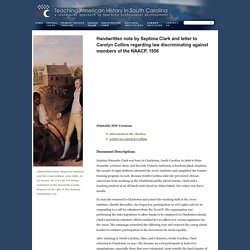
Septima, the second of eight children, attended the Avery Institute and completed the teacher training program in 1916. Because South Carolina state law prevented African Americans from teaching in the Charleston public school system, Clark took a teaching position at an all black rural school on Johns Island; Her salary was $35 a month. In 1919 she returned to Charleston and joined the teaching staff at the Avery Institute. Docsouth.unc.edu/sohp/G-0016/G-0016.html. [laughter] And I never will forget the. . . .
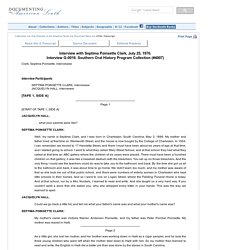
I went to meet Mrs. King at a meeting one Sunday in Chattanooga, and a lady told me that she'd like for me to be in the receiving line, coming from the mountains there, from Monteagle. She traveled twelve miles that night up to where I was living on top of that. . . . What kind of rock is that? No, it isn't Blowing Rock; another rock.
Scmmg630.pdf. Clark_Septima_P.pdf. Clark. Septima Poinsette Clark (1898–1987) - South, Carolina, Teaching, and School. An educator and civil rights activist, Septima Poinsette Clark was born in Charleston, South Carolina.
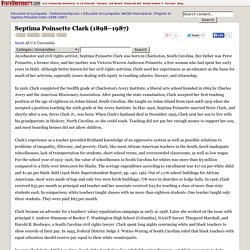
Her father was Peter Poinsette, a former slave, and her mother was Victoria Warren Anderson Poinsette, a free woman who had spent her early years in Haiti. Although better known for her civil rights activism, Clark used her experiences as an educator as the basis for much of her activism, especially issues dealing with equity in teaching salaries, literacy, and citizenship. In 1916, Clark completed the twelfth grade at Charleston's Avery Institute, a liberal arts school founded in 1865 by Charles Avery and the American Missionary Association. An Act of Courage, The Arrest Records of Rosa Parks. On December 1, 1955, during a typical evening rush hour in Montgomery, Alabama, a 42-year-old woman took a seat on the bus on her way home from the Montgomery Fair department store where she worked as a seamstress.
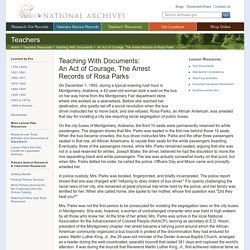
Before she reached her destination, she quietly set off a social revolution when the bus driver instructed her to move back, and she refused. Rosa Parks, an African American, was arrested that day for violating a city law requiring racial segregation of public buses. On the city buses of Montgomery, Alabama, the front 10 seats were permanently reserved for white passengers. The diagram shows that Mrs. Parks was seated in the first row behind those 10 seats. King Institute Encyclopedia.
To Coretta Scott King. Back to Contents King writes to his wife from the Georgia State Prison at Reidsville.
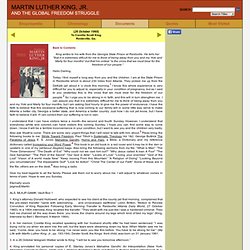
He tells her “that it is extremely dificult for me to think of being away from you and my Yoki and Marty for four months” but that his ordeal “is the cross that we must bear for the freedom of our people.” To Daisy Bates. Back to Contents On 27 June King thanked Bates and her husband, Lucius, for their hospitality during his May visit to speak at the Arkansas AM&N College commencement in Pine Bluff, and praised her efforts to “make Christians, real Christians and Americans, real Americans.” 1 In the following letter King invites Bates to serve as Dexter's Women's Day speaker on 12 October; she agreed on 3 July.
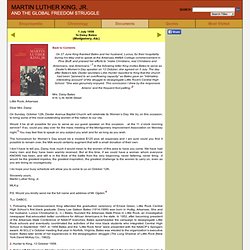
The day after Bates's talk, Dexter secretary Lillie Hunter reported to King that the church had been “jammed to an overflowing capacity” as Bates gave an “intimately interesting account” of the struggle to desegregate Little Rock's Central High School: “She was genuinely enjoyed. This conclusion I drew by the responsive Amens’ and the frequent foot patting.”2 Mrs. Daisy Bates 616 ½ W. Septima Clark: Teacher To A Movement. Unpublished Article by J.
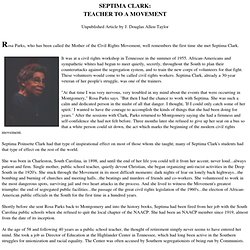
Douglas Allen-Taylor Rosa Parks, who has been called the Mother of the Civil Rights Movement, well remembers the first time she met Septima Clark. It was at a civil rights workshop in Tennessee in the summer of 1955. African-Americans and sympathetic whites had begun to meet quietly, secretly, throughout the South to plan their counterattacks against the segregation system, and to train the new corps of volunteers for that fight. These volunteers would come to be called civil rights workers. Septima P. Clark, South Carolina educator and civil rights activist. Septima Clark On this date in 1898, Septima P.
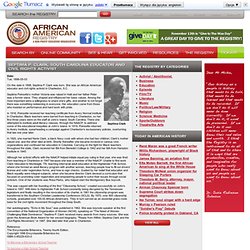
Clark was born. She was an African American educator and civil rights activist in Charleston, S.C. Septima Poinsette’s mother Victoria was raised in Haiti and her father Peter was a former slave. They shaped and influenced her basic values. Leaflet, “Don’t Ride the Bus,” Come to a Mass Meeting on 5 December. Arrest report for Rosa Parks. Letter_From_Ella_To_Abernathy.pdf. Clark, Septima Poinsette (1898-1987) Who Was Ella Baker? “The major job was getting people to understand that they had something within their power that they could use, and it could only be used if they understood what was happening and how group action could counter violence…” - Ella Jo Baker We build on Ms.
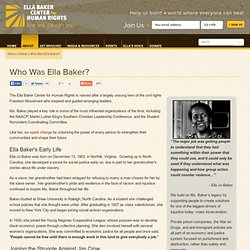
Baker’s legacy by supporting people to create solutions for one of the biggest drivers of injustice today: mass incarceration. Septima Poinsette Clark. Septima Poinsette Clark (May 3, 1898–December 15, 1987) was an American educator and civil rights activist.
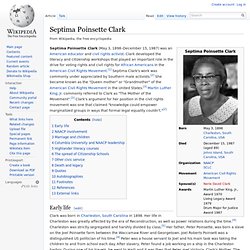
Clark developed the literacy and citizenship workshops that played an important role in the drive for voting rights and civil rights for African Americans in the American Civil Rights Movement.[1] Septima Clark's work was commonly under appreciated by Southern male activists.[2] She became known as the "Queen mother" or "Grandmother" of the American Civil Rights Movement in the United States.[3] Martin Luther King, Jr. commonly referred to Clark as "The Mother of the Movement".[2] Clark's argument for her position in the civil rights movement was one that claimed "knowledge could empower marginalized groups in ways that formal legal equality couldn't.
"[2] Mary McLeod Bethune. Mary Jane McLeod Bethune, (born McLeod) (July 10, 1875 – May 18, 1955) was an American educator and civil rights leader best known for starting a private school for African-American students in Daytona Beach, Florida. She attracted donations of time and money, and developed the academic school as a college. It later continued to develop as Bethune-Cookman University. She also was appointed as a national adviser to President Franklin D. Roosevelt. She was known as "The First Lady of The Struggle” because of her commitment to bettering African Americans.[1] Dr. Dorothy Height Told Us That It's Not a Man's Civil Rights World
Today, a memorial service was held for civil rights pioneer Dorothy Height The passing of Dr. Dorothy Height was a huge loss to the nation, particularly to American women. She inspired me and so many women leaders because she embraced and nurtured her sisters and daughters in the movement. I lost a role model and a mentor who, whenever we met, always clasped my hand in hers, looked me in the eyes and said, "Carry on. " Fannie Lou Hamer. She was instrumental in organizing Mississippi Freedom Summer for the Student Nonviolent Coordinating Committee (SNCC), and later became the Vice-Chair of the Mississippi Freedom Democratic Party, attending the 1964 Democratic National Convention in Atlantic City, New Jersey, in that capacity.
Her plain-spoken manner and fervent belief in the Biblical righteousness of her cause gained her a reputation as an electrifying speaker and constant activist of civil rights. Early life[edit] In 1917 Hamer was born in Montgomery County, Mississippi. She was the youngest of 20 children. Her family moved to Sunflower County, Mississippi in 1919 so the family could work on the plantation of E. Beginnings of activism[edit] During the 1950s, Hamer attended several annual conferences of the Regional Council of Negro Leadership (RCNL) in the all-black town of Mound Bayou, Mississippi. Jo Ann Robinson. Life[edit] Rosa Parks by Rosa Parks, Jim Haskins. Rosa Parks Biography -Biography Online. Rosa Louise McCauley Parks (1913 – 2005) was an African American civil right’s activist and seamstress whom the U.S. Congress dubbed the “Mother of the Modern-Day Civil Rights Movement”. Parks is famous for her refusal on 1 December 1955, to obey bus driver James Blake’s demand that she relinquish her seat to a white man.
Rosa Parks - Biography - Civil Rights Activist. Civil rights activist Rosa Parks refused to surrender her bus seat to a white passenger, spurring the Montgomery boycott and other efforts to end segregation. Buy Rosa Parks: My Story Book Online at Low Prices in India. Developing Perspective of Women in U.S. History: 1870 to Present. Much to my surprise at first, African American women actually played important roles in, thereby influencing the Civil Right Movement.
Waldschmidt_schwan.pdf. Sexism in the Civil Rights Movement: A Discussion Guide. Printer-friendly version. Gender in Civil Rights Movement: "Black Power" Era. The Collegian − The Official Student Newspaper of Houston Baptist University Since 1963. During Black History Month, students and teachers nationwide approach topics that address the struggles and triumphs of “the black man” in America. And much too often, the month-long celebration of African-American history is presented as such: the struggles and triumphs of the black man. Strong women were pillars behind civil rights movement. Civil Rights Leaders You Should Know. 97.03.10: American Women Who Shaped the Civil Rights Movement Explored Through the Literature of Eloise Greenfield. Traditionally women have played a significant role in the growth and development of children. Why black women were crucial to civil rights movement.
Honoring the Women of the Civil Rights Movement. Black Suffrage and the Struggle for Civil Rights/ Women's Leadership in America History. Women's Rights Movement in the U.S.: Timeline of Events (1848-1920) 97.03.10: American Women Who Shaped the Civil Rights Movement Explored Through the Literature of Eloise Greenfield.
Daisy Bates and Elizabeth Jacoway, conducted by Oral History Interview with Daisy Bates, October 11, 1976. Interview G-0009. Southern Oral History Program Collection (#4007). March 25, 1965: Rosa Parks in Montgomery. Digital History. How Rosa Parks Fought for Civil Rights. Rosa Parks - Black History. Academy of Achievement. Welcome to the Civil Rights Digital Library. HandoutOne_Biographies.pdf. Women Make History: An Untold Story of the Civil Rights Movement. Heroic Women in Civil Rights. Heroic Women in Civil Rights.